Cyber Wellness @ Peicai
Cyber Wellness
Objectives:
|
Cyber Wellness in Character and Citizenship Education (CCE) focuses on the well-being of our students as they navigate cyberspace. Our curriculum aims to equip students with the knowledge and skills to harness the power of ICT for positive purposes, maintain a positive presence in cyberspace and be safe and responsible users of ICT. The 3 Cyber Wellness Key Messages
|
Curriculum:
Cyber Wellness education is conducted through CCE lessons, key Student Development Experiences (SDEs) beyond the classroom, school-based initiatives, teachable moments during subject lessons, and learning opportunites beyond school. It involves understanding what responsible behaviour entails when a student is exploring cyberspace as well as the knowledge, skills, values, and attitudes one should possess in order to protect oneself online.
Cyber Wellness Framework – Sense, Think and Act
The school adopts MOE’s Cyber Wellness Framework, which focuses on three key processes: Sense, Think and Act.
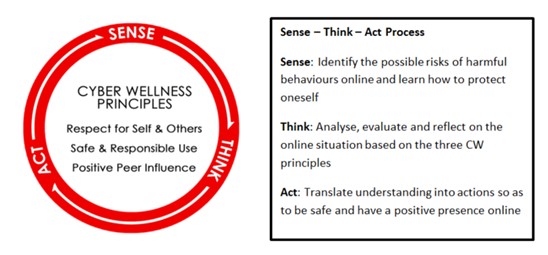
Authentic case studies and real-world examples are integrated into lessons for students to ‘Sense’ & ‘Think’, providing opportunities to reflect on how Cyber Wellness relates to their daily routines.
Platforms such as Values-in-action Projects and opportunities to take part in community projects provide our students with the ability to take on the role as advocates to share the messages of Cyber Wellness with their peers, family and public.
Topics covered :
|
Cyber Use |
maintain a healthy balance of their online and offline activities
|
|
Cyber Identity |
develop a healthy online identity express oneself online appropriately to be authentic and achieve congruence between online and offline identity
|
|
Cyber Relationships |
develop meaningful, respectful, and safe online relationships (e.g. understanding and standing-up against cyber bullying, build positive relationships)
|
|
Cyber Citizenship |
understand the cyber world and make informed choices about participation in online activities (e.g. accessing online content with malicious intent/inappropriate websites with content that is violent, sexual or harmful in nature)
recognise and protect oneself and others from online risks associated with people who may have malicious intent (e.g. hackers, scammers, online predators)
being a positive presence and influence in the cyber community
|
|
Cyber Ethics |
create and share online content in a responsible manner (e.g. not sharing content from questionable sources and not propagating deliberate online falsehoods)
respect copyright
|
Key Programmes:
2025
National Cyber Wellness Competition
Organised by Pasir Ris Secondary School and the Media Literacy Council in support of the "Digital for Life" initiative, this year's competition focused on three pivotal areas: Discerning Fake News; Cultivating Safe Gaming Habits; Ensuring Social Media Safety
Our students submitted a total of six entries — five group posters and one individual poster — as a culmination of their research, creative expression, and understanding of crucial cyber wellness themes such as digital safety and cyber ethics.
This competition provided an enriching platform for students to develop essential 21st Century Competencies. Through collaborative teamwork, they enhanced their Communication, Collaboration, and Information Skills, critically evaluating online content and translating their insights into engaging visual messages. They also demonstrated Critical and Inventive Thinking, navigating complex topics like misinformation and proposing innovative solutions. Most importantly, this experience deepened their Civic Literacy, reinforcing their roles as thoughtful and responsible digital citizens.
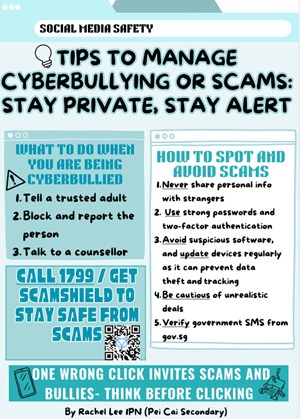
|
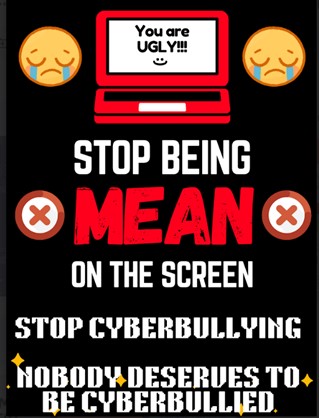
|
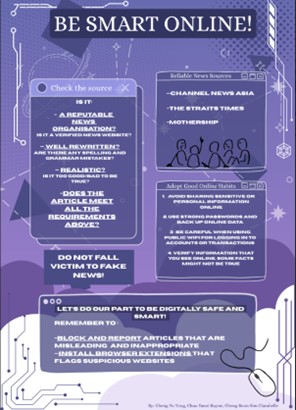
|
|---|---|---|
|
Individual Category – Certificate of Participation - Lee En Qi Rachel (1PN)
|
Group Category – Certificate of Participation Zachery Tan Teng Jin (1MN) Goh Chen Xi Xavier (1MN) Nathaniel Ong Choon Hock (1MN)
|
Group Category – Certificate of Participation Cheng Yu Tong (1MN) Chua Yanxi Rayne (1MN) Cheng Boon Sim Clarabelle (1MN)
|
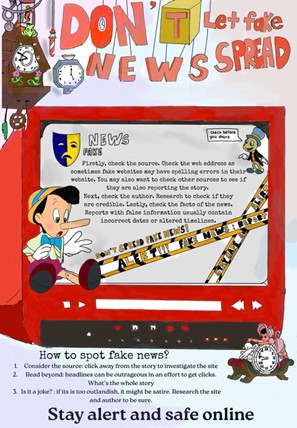
|
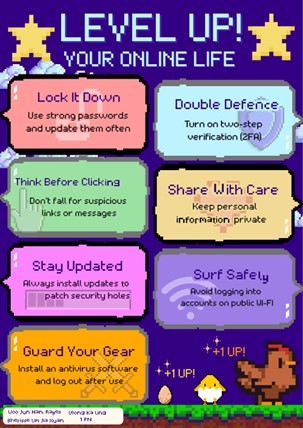
|
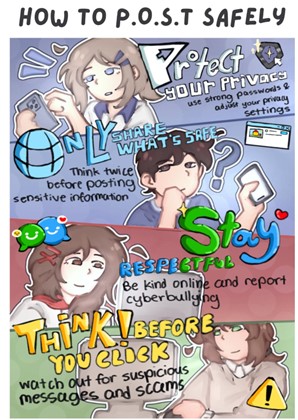
|
|
Group Category – Certificate of Participation Charmaine U Zhi Yien (1MN) Toh Xi Tong (1MN) Nur Zahara Binti Abdullah (1MN)
|
Group Category – Certificate of Participation Woo Jun Han Rayes (1PN) Sherisse Lim Jia Xuan (1PN) Leong Ka Ling (1PN)
|
Group Category – Certificate of Participation Leong Kar Mun Kirsten (2CY) Low Yue En Katie (2CY) Pok Ruey En (2CY)
|
Singapore Schools Cyberwellness Challenge (SSCWC)
We would like to highlight the participation of our student mentors, Grace Mercy Tomy and Pratheepan Poorni in the Singapore Schools Cyber Wellness Challenge (SSCWC). This national short film competition, supported by the Media Literacy Council, is designed to promote youth advocacy and cultivate student leadership in Cyber Wellness education.
The challenge features a unique collaborative structure, with each team comprising primary school participants led by two secondary school mentors. In this role, Grace and Poorni guided a talented team of three students from Zhangde Primary School, embodying the programme’s goal of integrating Peer Support and Relationships into digital literacy.
Under the 2024 theme "Be Safe, Be Kind, Be Smart," the team first explored critical Cyber Wellness issues, then applied their insights to storyboard and develop a film concept, ultimately producing their short film using applets and video-editing software.
This immersive experience empowers students to create meaningful media that educates both their peers and the wider community.
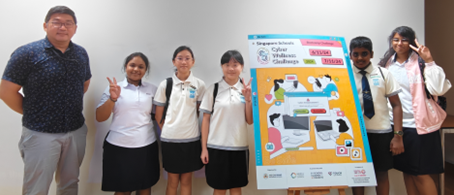
|
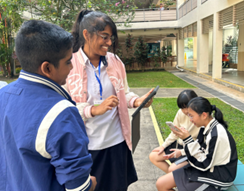
|
|---|---|
Be Cybersafe - Cybersecurity Sharing by Cybersecurity Agency of Singapore (CSA)
In this assembly talk on Cyber Citizenship, students learned how being digitally alert and responsible online is crucial in protecting themselves and others from risks posed by hackers, scammers, and online predators. They explored how malware and phishing attacks can easily compromise personal devices and information. Emphasizing the need to stay one step ahead of ill-doers, the session covered recognizing phishing attempts, enabling 2-Factor Authentication (2FA), and using strong passphrases. Real-life demonstrations reinforced the importance of safeguarding our digital spaces from malicious intent.
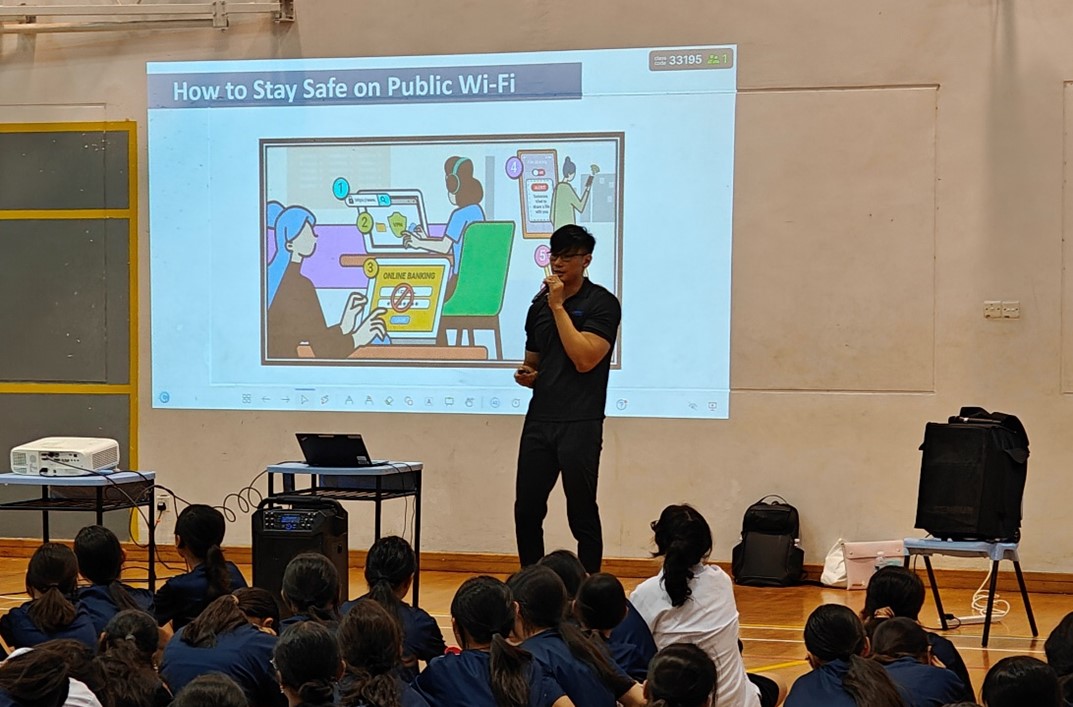
|
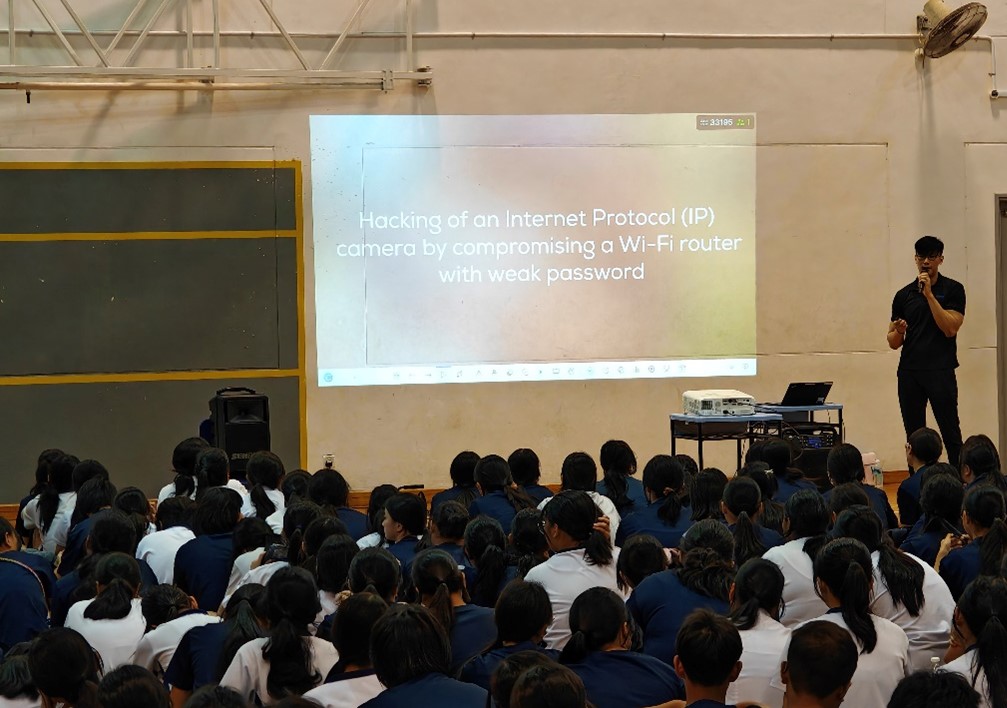
|
|---|---|
|
Students gained valuable insights from Mr. Ho Zhi Ming, Consultant at CSA, on safeguarding their online activities by establishing secure routines and enabling protective measures such as 2-Factor Authentication (2FA). |
|
National Cyber Wellness Advocacy Challenge (NCAC) Enrichment Module
Our students participated in the National Cyber Wellness Advocacy Challenge Enrichment Module, which aims to raise awareness about fake photos, videos, and news. Through this module, they learned to ask the right questions, evaluate information critically, and compare various news sources to gain broad and balanced perspectives.
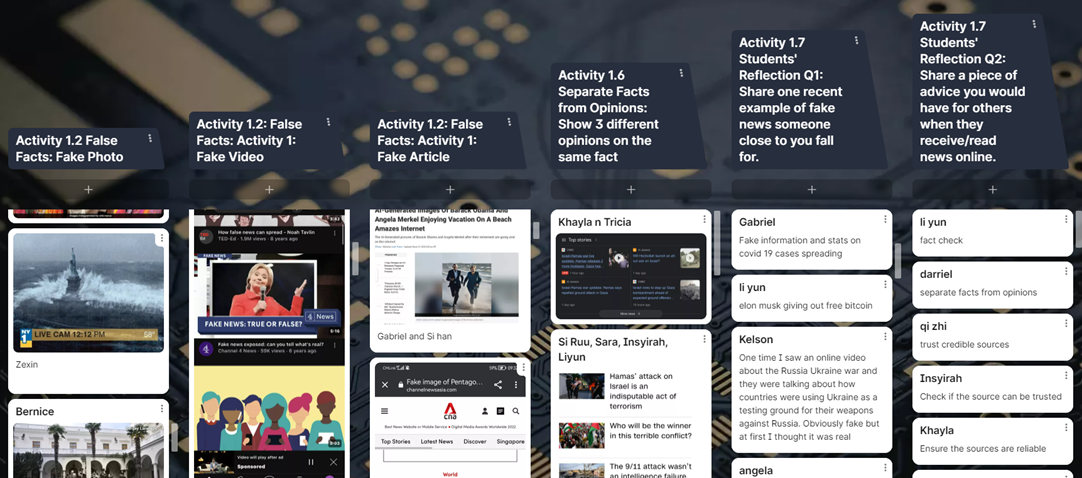
|
|---|
|
Students actively learning to identify fake news and verify information using multiple sources. |
2024
2024
Singapore Schools Cyberwellness Challenge (SSCWC)
We are incredibly proud to celebrate the participation of our student mentors, Grace Mercy Tomy (3C3) and Pratheepan Poorni (3C4), in the recent Singapore Schools Cyber Wellness Challenge (SSCWC). This national short film competition, supported by the Media Literacy Council, is designed to promote youth advocacy and cultivate student leadership in Cyber Wellness education.
The challenge features a unique collaborative structure where each team comprises primary school participants led by two secondary school mentors. In this role, Jesmine and Poorni guided a talented team of three students from Zhangde Primary School, embodying the programme’s goal of integrating Peer Support and Relationships into digital literacy.
Under the 2024 theme "Be Safe, Be Kind, Be Smart," the team first explored critical Cyber Wellness issues and applied their insights to storyboard and develop a film concept and finally producing their short film using the applets and video-editing software.
This immersive experience empowers students to create meaningful media that can educate their peers and the wider community. Congratulations to Grace and Poorni on their outstanding commitment and leadership!
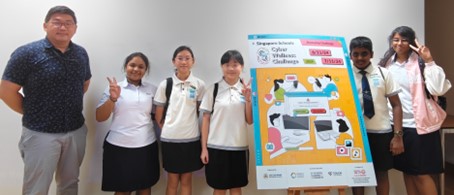
|
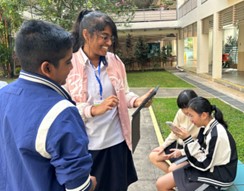
|
|---|---|
Be Cybersafe - Cybersecurity Sharing by Cybersecurity Agency of Singapore (CSA)
In this assembly talk on Cyber Citizenship, students learned how being digitally alert and responsible online is crucial in protecting themselves and others from risks posed by hackers, scammers, and online predators. They explored how malware and phishing attacks can easily compromise personal devices and information. Emphasizing the need to stay one step ahead of ill-doers, the session covered recognizing phishing attempts, enabling 2-Factor Authentication (2FA), and using strong passphrases. Real-life demonstrations reinforced the importance of safeguarding our digital spaces from malicious intent.
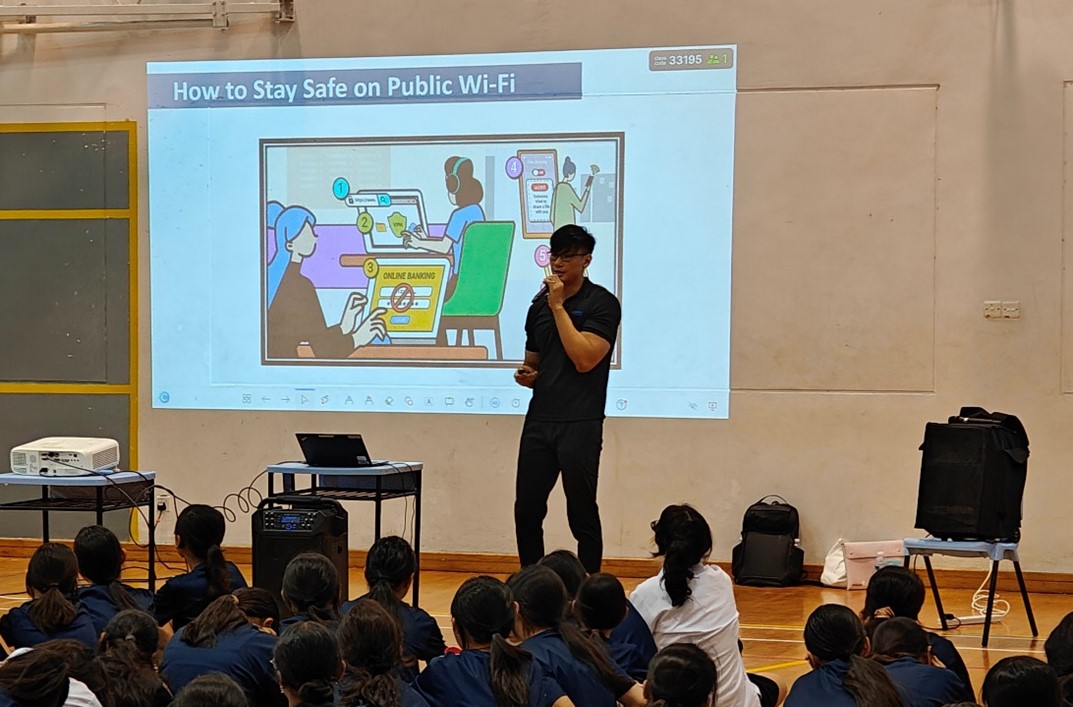
|
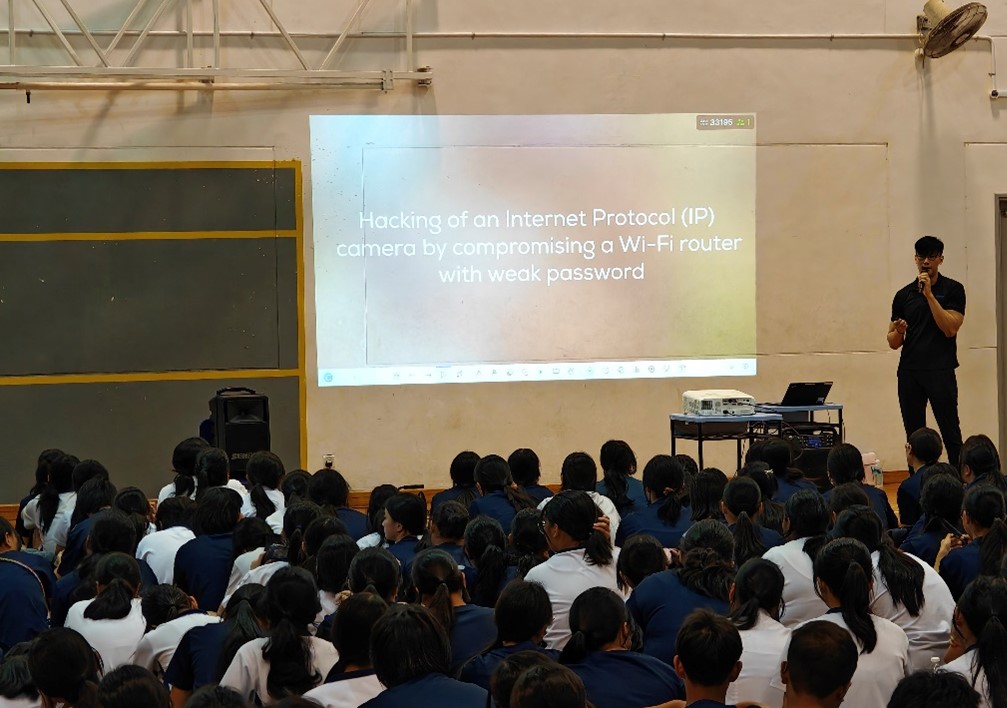
|
|---|---|
|
Lower Secondary students learned from Mr. Ho Zhi Ming, a Consultant at CSA, on how to safeguard our online activities by establishing routines and enabling security measures like 2-Factor Authentication (2FA). |
|
National Cyber Wellness Competition
Organised by Pasir Ris Secondary School and the Media Literacy Council in support of the "Digital for Life" initiative, this year's competition focused on combating Fake News and raising awareness among youth about "Being Smart Online." Our students submitted five poster entries for the competition, highlighting the importance of Cyber Ethics—creating and sharing online content responsibly, avoiding questionable sources, and preventing the spread of deliberate falsehoods.

|
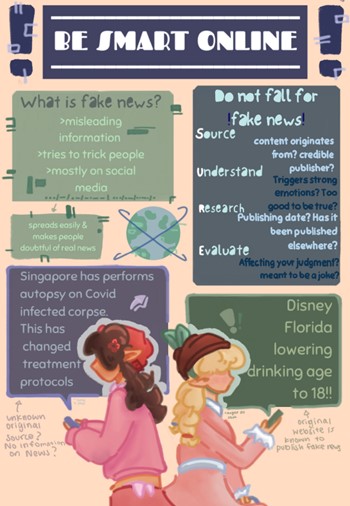
|
|---|
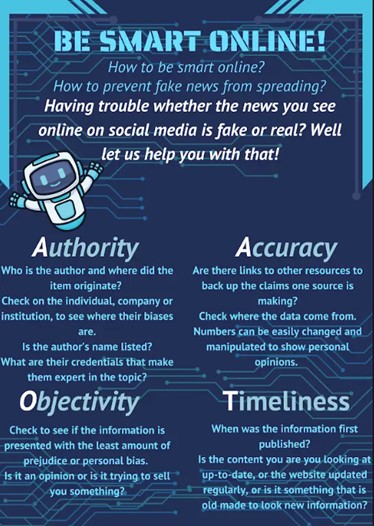
|
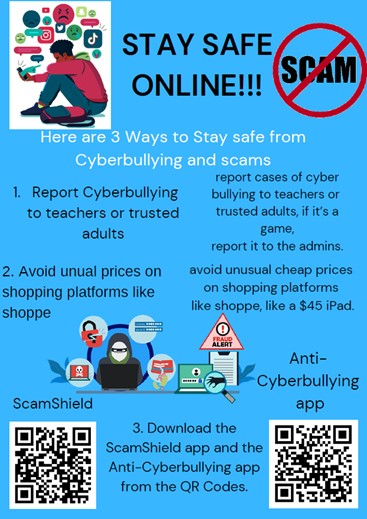
|
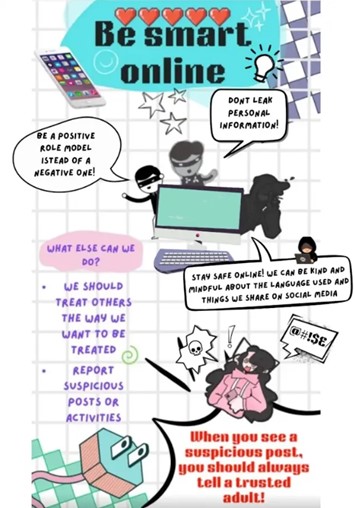
|
|---|---|---|
|
(Submission entries by (top row) 1CY Pok Ruey En, 1CE Sophia Chin Sze En, (bottom row) 1CY Low Yue En Katie, 1CY Yip Kin Hoe, 1CE Tay Xin Ling Joanne & 1CE Shadrina Hazirah Shamsul Hisyam) |
||
2023
2023
National Cyber Wellness Advocacy Challenge (NCAC) Enrichment Module
Our Secondary 3 students had participated in the National Cyber Wellness Advocacy Challenge Enrichment Module which aims to sensitise students to the presence of fake photos, videos and news. They are taught to ask the right questions to evaluate information critically and to compare different news sources to get broad and balanced perspectives.
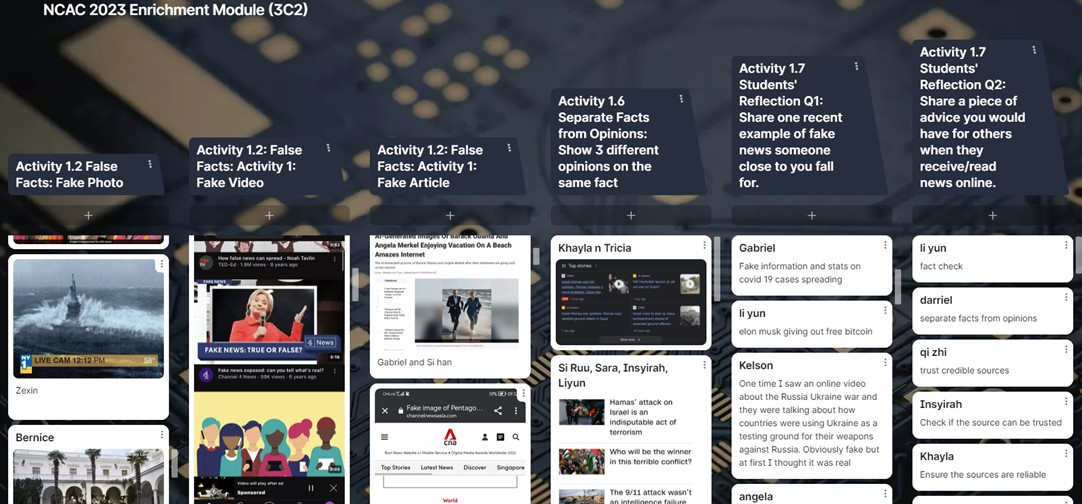
|
|---|
|
Students Actively Learning about Fake News and How to Verify Information from Multiple Sources |

